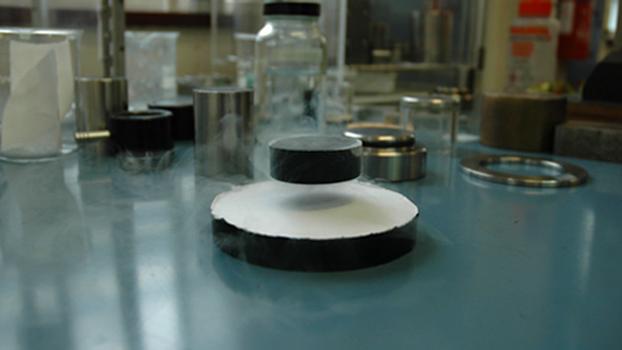Cambridge
Latest

Massive DNA study of human cancers offers new clues about their causes
UK scientists analyzed the complete genetic makeup of 12,000 tumors from NHS patients.

Researchers may have exposed Facebook quiz data on 3 million users
Once again, an app on Facebook has been linked to potential exposure of personal information. Researchers stored responses from a personality application running on the social network on an insecure website, which could have exposed answers from up to 3 million users, according to a New Scientist report. While this isn't as severe as the Cambridge Analytica leak, it's distantly connected. The data was held by academics from the University of Cambridge's Psychometrics Centre -- and the project had previously involved Alexandr Kogan, the researcher embroiled in the Cambridge Analytica scandal.

Facebook hires digital forensics firm to audit Cambridge Analytica
Days ago, Facebook suspended the parent company of political analysis firm Cambridge Analytica after news broke that it allegedly harvested personal data from some 50 million users. While the social network reportedly tried to sue The Guardian before the publication released the initial news with the help of a whistleblower, Facebook has dialed back its position. Today, the social network announced it has hired digital forensics outfit Stroz Friedberg to audit the political analysis firm.

Chinese bike rental giants eye the UK as next battleground
London's for-hire 'Boris bikes' have been cruising the capital's streets for nearly seven years now, while similar projects operate in other parts of the country. Two Chinese companies believe there's still room for more innovative bike rental schemes, however, and both are expanding outside of Asia to compete anew in the UK. One of these is Mobike, which today announced that its plans to move into Europe begin in Manchester and Salford, where 1,000 bikes will be available to hire starting on June 29th. The launch comes after rival Ofo began a UK pilot of its own in Cambridge two months ago, though it's a much more modest trial with only tens of bikes dotted around town.

ICYMI: Photos of wild animals that are far superior to yours
try{document.getElementById("aol-cms-player-1").style.display="none";}catch(e){}Today on In Case You Missed It: The BEASTCAM is a camera rig to scan live animals for fast 3D models to share with educators. Meanwhile Cambridge Consultants is marketing the Ekano mobile surgical suitcase for surgeons to use in developing countries. The very important Whisk Wiper is available online and the rotary dialing smartphone is here. As always, please share any interesting tech or science videos you find by using the #ICYMI hashtag on Twitter for @mskerryd.

The FBI missed a trick to hack the San Bernardino iPhone
The FBI told Congress it couldn't hack the San Bernardino shooter's phone without Apple's aid, but a researcher has proved that claim was inaccurate. "The process does not require any expensive and sophisticated equipment," wrote University of Cambridge researcher Sergei Skorobogatov. "All needed parts are low cost and were obtained from local electronics distributors."

MIT's ridesharing network is learning to dodge pedestrians
Lyft and Uber already operate in and around Boston, but students on MIT's campus in Cambridge, MA also have a new, research-oriented option for on-demand ridesharing. Ford and MIT announced today a new project that will shuttle students around on both campus walkways and city streets in a fleet of electric shuttles -- but the project isn't just for helping lazy college kids get to class, it will also be conducting research on pedestrian traffic patterns that will help it optimize the service, as well as future generations of autonomous vehicles.

Inhabitat's Week in Green: Solar roadways, and more!
Photovoltaic roads sound almost like science fiction, but they're becoming reality in the US. This week Missouri announced plans to pave a section of the historic Route 66 with energy-generating Solar Roadways tiles. In other futuristic transportation news, Russia wants to build a 44-mile-long hyperloop track that stretches along the coast to China. Driverless cars are expected to hit prime time within the next five years, and we explored whether the convenience they offer will fuel suburban sprawl. Volkswagen promised to pay a whopping $14.7 billion to owners of cars affected by the emissions cheating scandal. And if you hate parallel parking, check out these incredible omnidirectional wheels that allow any car to drive sideways.

ICYMI: Self-building bot, fresh tortillas from pods and more
#fivemin-widget-blogsmith-image-484230{display:none;} .cke_show_borders #fivemin-widget-blogsmith-image-484230, #postcontentcontainer #fivemin-widget-blogsmith-image-484230{width:570px;display:block;} try{document.getElementById("fivemin-widget-blogsmith-image-484230").style.display="none";}catch(e){}Today on In Case You Missed It: MIT's Tangible Media Lab built a shifting interface that can be used to test basic physics and even help seismologists understand the ripple fallout from an earthquake. A Kickstarter device for a tortilla-maker costing $240 irritated us enough to call on the latest environment chart made by a climate scientist. And German researchers built a robot that can build itself and our robot eek factor continues to grow. A drone performed a neat liquid trick over on YouTube and has us excited for the delivery UAVs to come! As always, please share any great tech or science videos you find by using the #ICYMI hashtag on Twitter for @mskerryd.

ICYMI: Pollution sea vacuum, SpaceX's success and more
#fivemin-widget-blogsmith-image-999936{display:none;} .cke_show_borders #fivemin-widget-blogsmith-image-999936, #postcontentcontainer #fivemin-widget-blogsmith-image-999936{width:570px;display:block;}try{document.getElementById("fivemin-widget-blogsmith-image-999936").style.display="none";}catch(e){}Today on In Case You Missed It: SpaceX successfully landed its reusable rocket, from a height of 125 miles-- then Elon Musk and Blue Origin CEO Jeff Bezos traded Twitter jabs for our entertainment. Scientists from Cambridge University found that oil droplets change into artificial shapes like octagons when frozen in soapy water, then return to their normal shape when heated. And a nearly $4,000 gadget for sailors aims to clean up the dirty marinas where debris and oil spills often mar the seafaring beauty.

Stephen Hawking believes he knows how information escapes black holes
Stephen Hawking announced during a lecture at the KTH Royal Institute of Technology in Stockholm, Sweden on Tuesday that he has potentially solved the Information Paradox. The paradox a conflict between the quantum mechanics and general relativity models that has vexed physicists for more than four decades. The Information Paradox arises from black holes -- specifically what happens to information about the physical state of objects that fall into one. The quantum mechanical model posits that the information remains intact while general relativity argues that it is indeed obliterated under the black holes immense gravitation. But Hawking has developed a third opinion: the information never actually makes it into the black hole. "I propose that the information is stored not in the interior of the black hole as one might expect, but on its boundary, the event horizon," he said.

ICYMI: Far away haptic hello, birthing robot mom and more
#fivemin-widget-blogsmith-image-3569{display:none;} .cke_show_borders #fivemin-widget-blogsmith-image-3569, #postcontentcontainer #fivemin-widget-blogsmith-image-3569{width:570px;display:block;} try{document.getElementById("fivemin-widget-blogsmith-image-3569").style.display="none";}catch(e){}Today on In Case You Missed It: The Haptoclone allows users to touch and interact with distant objects, in a way you have to see to understand. But basically, long-distance makeouts over Skype are coming. Cambridge University researchers designed a robot that can make it's own 'children,' then test them for the strongest features, to then incorporate for the following generation. And the FIA Formula E Championship (the E is for electricity-based power) just showcased its new cars for the start of its second official season.

Huawei's just bought an internet-of-things startup
Whenever we talk about Huawei, it's normally within the context of the company's growing smartphone business. What we don't talk about as much is the Chinese giant's massive networking operation -- but it's this department that's making a big entry into the Internet of Things. Huawei has announced that it's buying Neul, a Cambridge-based startup that specializes in building low-power wireless sensors for monitoring in various industrial and medical applications. Neul is probably most famous for having built the UK's first smart road, a 50-mile chunk of highway designed to monitor traffic flow and avoid congestion. Huawei has pledged to use its vast resources to turn Neul's Cambridge HQ into an "internet of things stronghold" which, we're sure, will go down really well with those people who refuse to deal with the company on security grounds.

Record-breaking magnet crams three tons of force into the size of a golf ball
University of Cambridge scientists have broken a decade-old superconducting record by packing a 17.6 Tesla magnetic field into a golf ball-sized hunk of crystal -- equivalent to about three tons of force. The team used high-temperature superconductors that work at minus 320 degrees F or so -- not exactly balmy, but less frigid than the minus 460 degrees F needed for regular superconductors. With zero resistance, superconducting materials can carry up to 100 times more current than copper wires, but the resulting magnetic fields create huge internal forces. Since the cuprate materials used for the record are as fragile as dried pasta, they can actually explode under the strain. To get around it, the team modified the material's microstructure and "shrink-wrapped" it in stainless steel. That produced the largest magnetic field ever trapped in a standalone material at any temperature, according to the team. The research might eventually lead to more secure and efficient power transmission, better scanners and yes, levitating monorails. [Image credit: University of Cambridge]

Scientists reverse aging in mice by giving them young blood
Plots from The Simpsons are rarely prophetic, but it appears as if, just as it did for Mr. Burns, the blood of the young could help to stave off the signs of aging. Competing teams at Harvard, Cambridge and the University of California have found that pumping the blood of juvenile mice into elderly rodents saw the latter suddenly able to run much faster, had more blood vessels in the brain and had much clearer thinking. Harvard researchers subsequently isolated a protein called GDF11, which helped both the operation of hearts and brains. Given the limits of the study, the teams are cautious about what this could mean for human biology, and there's plenty of trials still to be done, but maybe it'd be wise to start being nice to any juvenile relatives you've got -- you never know when you might be asking them for a transfusion.

Cambridge University starts Doomwatch unit, hires Skype co-founder to fight the future
Despite warnings to the contrary, Cyberdyne, SkyNet and Demon Seed are technological terrors that currently exist. No matter, as we've now got someone leading the fightback -- Skype co-founder Jaan Tallinn. He's part of a team of scientists, engineers and philosophers at Cambridge University's newly-minted Centre for the Study of Existential Risk. Aping the plot of beloved '70s TV series Doomwatch, the unit will investigate the fringes of science fact, including biotechnology, artificial intelligence and climate change. He'll be joined by Huw Price and Baron Martin Rees, who we hope will travel around the country in a minivan and fight ghosts, just like these guys.

Microsoft Research crafts wrist-worn device that tracks hand gestures in 3D space (video)
A team led by researchers at Microsoft's UK-based R&D lab has crafted a system that tracks the full 3D pose of a user's hand without the need for a pesky glove. Dubbed Digits, the Kinect-inspired rig latches onto a user's wrist and utilizes a diffuse infrared light, IR laser, camera and inertial measurement unit to track fingertips and just five key points of a hand. Leveraging a pair of mathematical models developed in-house after studying the mechanics of the human hand, the group uses the captured data to extrapolate the position of a user's paw. The team envisions the solution as a supplement to touch-based interfaces, a method for eyes-free control of mobile devices and as a gaming controller that could work in conjunction with Kinect or similar systems. In its current state, the device is composed of off-the-shelf parts and needs to be tethered to a laptop, but the ultimate goal is to create a mobile, self contained unit the size of a wrist watch. Hit the break to catch a video of the setup in action or tap the second source link below for more details in the group's academic paper.

Rogers LTE hits 18 new regions, delivers speedy data in Saskatoon
Rogers promised that October 1st would be a grand day for its LTE expansion plans, and we're now learning that it might have been underpromising to overdeliver later. The carrier just flicked the 4G switch for 18 cities and regions, or eight more territories than it had promised just two weeks ago. Most of the coverage still focuses on the southern tip of Ontario, including London, the Oshawa area and RIM's hometown of Waterloo, but there's a much more trans-Canada bent to the official deployment. Western cities like Saskatoon and Victoria now fit into Rogers' LTE map beyond a previously announced Edmonton, while the Quebec rollout is going past Quebec City to include Sherbrooke and Trois-Rivières. All told, the one day of growth is enough to supply Rogers LTE to almost 60 percent of Canada's population -- a convenient figure when one of the year's more important LTE smartphones just became available less than two weeks prior. [Thanks, Jon]

Cambridge University helps new Raspberry Pi users break the crust with free guide, tutorials
It all looks so simple, doesn't it? A little board, a cute name -- why, you'll be up and robot-ing in no time, right? Well, just ask one of our techiest editors, who tried to learn a similar product, the Arduino -- and failed -- boards like the Pi are not cake. So, to push you in the right direction, Cambridge University is offering a free guide to creating a simple OS for the device called "Baking Pi." It's part of a course for new students of the institution's computer lab (who each get a Pi as part of their tuition), but the guide and a tutorial series are free to the public, as well. Programming experience is not required "if you are smart and persistent," but it will certainly be easier if you have some, according to the Pi website. The campus, which is the seat of the Raspberry Pi Foundation, certainly has a vested interest in getting new coders to the board -- not that they need to create any more demand. Check the source and coverage below for the guide and tutorials. [Image credit: Mark Foss]

Nokia experiments with location-based white space services in Cambridge, UK (video)
Following news of the first successful white space trials in Cambridge, UK, Nokia is now touting its research in the area with a demonstration of location-based services for the unlicensed spectrum. Traditionally, proponents of white space usage have positioned this unused portion of the airwaves as a viable, low-cost method of data transmission, but the Nokia folks have now demonstrated its ability to pinpoint one's location with much greater accuracy than either WiFi or cellular networks. Think of it as a counterpoint to NFC, if you will, but in the following clip, we're shown how an individual might move throughout a museum, and as they approach various exhibits, one's smartphone could provide supplemental information for the nearby artifacts. Beyond its use in museums, Nokia also foresees the technology as useful in the retail space, where businesses may provide consumers with promotions as they walk by. Currently, the necessary equipment to make this all possible is much too large to fit within a typical smartphone, but Nokia hypothesizes that the necessary chipsets and industry standards may be in place by 2015. Until then, you can dream of what might be with the following video.










